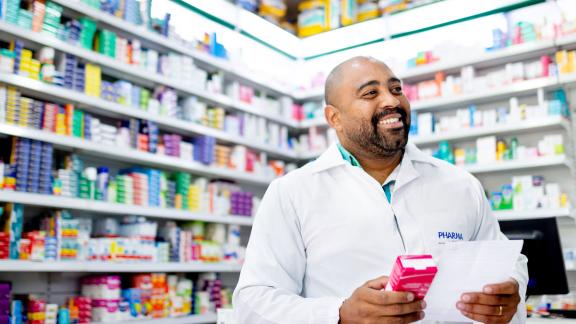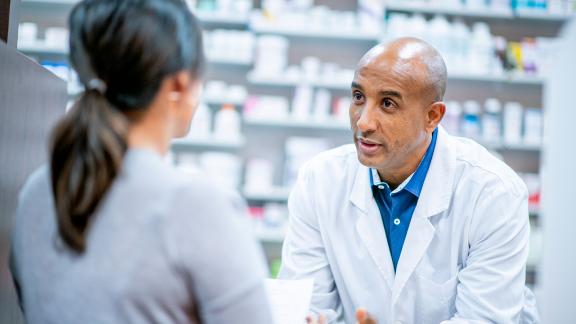Community pharmacy could ‘save’ the NHS

As part of his reforms, Andrew Lansley aimed to remove the NHS from “the tyranny of the political cycle”. However, the recent party conference season has seen undeliverable promises of more GPs, more nurses and easier access to primary care, from all parties.
These promises were made despite a reported £30 billion funding shortfall. It costs upwards of £500,000 to train a GP, takes the best part of a decade, and then they expect an annual income above £100,000. The Royal College of General Practitioners says we need another 16,000 GPs just to cope with the current workload. It’s simply, patently, unaffordable. Even if the NHS had the cash, it doesn’t have the time.
Meanwhile, there is a crisis. One of my local GP practices has effectively collapsed due to its inability to recruit doctors. A second has the workload for three GPs but cannot recruit a third partner, or even find a locum.
But the NHS is actually very efficient by world standards. It is arguable that most of the efficiencies have already been realised. Small, incremental changes won’t cut it! We need a paradigm shift – one that takes far greater advantage of community pharmacy.
Pharmacists are perfectly placed to help relieve both the financial and GP recruitment crises, and we are ready, willing and able to start work today. These days, pharmacists undergo thorough clinical training, over five years.
Although we have a desperate shortage of GPs, we have a relative over-production of pharmacists. I use the term ‘relative’ because it is relative to the traditional ‘safe supply’ or core dispensing role. Pharmacists could do so much more – and we will need the extra pharmacists to carry-out additional services.
A few thousand freshly-minted, eager and highly-qualified professionals could literally ‘save the NHS’. They could be trained as prescribers in six months and then run clinics and common-ailment schemes in GP surgeries or pharmacies. They could also work as healthy-living pharmacists and improve the public’s health.
The entire community pharmacy service costs less than £3 billion. The NHS spends around £12 billion on prescribed drugs (half of which are never consumed). Simply put, community pharmacy is an amazing bargain for the NHS.
A modest additional investment would ensure that each pharmacy has more than one pharmacist for some or all of the time, depending on how busy it is and how many services it provides. An increase in pharmacy funding would pay massive dividends in terms of improved use of medicines, improving the public's health, reducing costs in secondary care, and taking the pressure off the GP network. Evidence shows that every NHS pound spent in the pharmacy saves £2 in the surgery, and at least £5 in secondary care.
GPs warn of stress and burnout, yet around 57 million GP appointments each year are for common ailments that could be handled by community pharmacists. Not only would it free-up all those GP appointments, it would save the NHS around £100 million, because pharmacists are less expensive than GPs.
Yet despite substantial evidence that these ‘pharmacy-first’ schemes work, showing high patient satisfaction levels and low re-consultation rates, they remain few and far between. The pharmacy profession has argued that the NHS should commission a common-ailments service nationally (the Scottish NHS has already done so), yet these calls have fallen on deaf ears. Why?
Evidence shows that 12 to15 per cent of hospital admissions are directly related to prescribed drugs. Roughly half are due to complex interactions between a cocktail of prescribed drugs, prescribed in response to a plethora of concurrent disease states. The other half is due to poor compliance.
Patients are highly resistant to taking their medicines consistently, or at all. The drugs are wasted and patients don’t get the benefit, so morbidity increases and NHS costs rise. This is true for all long-term conditions: even HIV and transplant patients are poorly compliant. There is plenty of evidence that pharmacists can make a cost-effective difference if commissioned to do so.
But the NHS locality-based commissioning system overwhelmingly ‘gates’ pharmacy out. The solution is to add core medicines optimisation and public health services to the pharmacy national contract, and to align the community pharmacy contract to that of GPs. This would deliver the pace and scale of change the NHS needs. Instead of 150 different smoking-cessation services, let’s have one, outcome-driven and based on the quality and outcomes framework.
Besides smoking cessation, we should commission alcohol, drug addiction, weight management and sexual health services nationally through the pharmacy contract, plus a common-ailments service like the one in Scotland. That would free-up local resources to commission specific local services.
The pharmacy profession has an evidence base and widespread support for extending our contribution. We now need to up the ante and bang the drum for pharmacy and the NHS. But the best advocates are not pharmacists, they are patients and other professional colleagues. If, like me, you believe pharmacy could (help) save the NHS, please, please join the campaign for us to do so.
Graham Phillips is a community pharmacy proprietor from Wheathampstead, Hertfordshire. Follow him on Twitter @grahamsphillips
Like this post?
Share it on Twitter.


